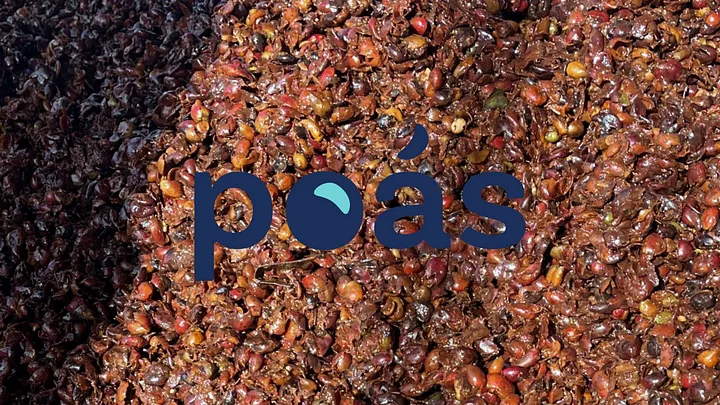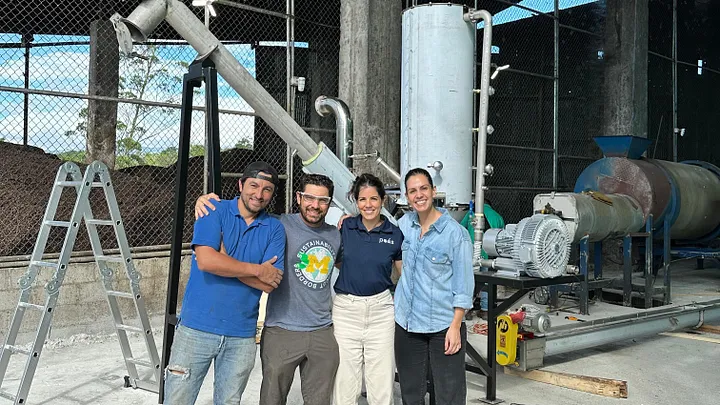Why We Invested in Poás Bioenergy | Transforming the agricultural waste crisis into a circular and regenerative model
Agribusinesses across Latin America face the costly and environmentally challenging task of managing post-processed agricultural biomass waste (think coffee fruit pulp, banana peels, pineapple crowns, or fresh coconut husks). Poás Bioenergy converts this waste into carbon-sequestering biochar and on-site clean energy creating a truly circular, regenerative model. Its plug-and-play reactors handle high-moisture biomass with ease, reducing disposal costs, cutting emissions, and sharing carbon-credit revenue with the smallholders powering Latin America’s food chains. Here’s why this solution will be crucial for building climate resilience.
THE MARKET NEED
Agricultural activities from crops and livestock production are responsible for around 20% of all greenhouse gas emissions primarily methane and nitrous oxide. In 2022, global agrifood systems emissions reached 16.2 billion tones of carbon dioxide equivalent (Gt CO2eq), marking a 10% increase from 2000. Crop residues alone accounted for an estimated 4% of these emissions.
Across Latin America, specifically, crops like coffee, pineapple, and coconut generate enormous volumes of wet biomass waste, a problematic byproduct that is often left untreated or else removed via unsustainable mechanisms. This waste is usually burned or discarded in open fields, releasing harmful methane emissions, attracting pests, contaminating water sources, and degrading soil health.
Unlike dry biomass (such as husks or shells), wet biomass is heavy, cumbersome and expensive to handle, and prone to decomposition, making treatment a persistent pain point for agri-processors. In tropical regions, high moisture content exacerbates these issues, often leading to the use of large quantities of pesticides during waste treatment to try to dry organic material prior to removal.
As biomass waste accumulates and decomposes, ecosystems already strained by climate change face further environmental stresses from untreated and decaying biomass. The impacts are especially severe for the smallholder farmers who supply these agri-processors and depend on these ecosystems for their livelihoods, as they face falling yields, disease outbreaks, and heightened vulnerability to climate shocks like drought and flooding. These farmers often operate on thin margins and any environmental disruption can threaten their financial instability. What’s more, they are often subject to the fines associated with improper waste disposal — experiencing a reduced share of profits or lower prices for their crops (to offset the high costs incurred in waste management).
Meanwhile, global food companies are facing increasing regulatory pressure (like the EU’s Green Deal) to decarbonize their supply chains and meet sustainability goals. Yet few solutions are tailored to the realities of tropical agriculture or accessible to the processors and cooperatives working with thousands of smallholder farmers.
A circular and regenerative model offers the opportunity to effectively address these challenges — to reduce emissions while improving soil health and ecosystem resilience. Although biomass gasification and pyrolysis have long been explored as solutions to manage agricultural waste, most existing technologies have critical limitations: they are too expensive for most agri-processors, unsuited for high-moisture biomass, and often lack the efficiency needed to generate meaningful savings or benefits. Additionally, in many cases, the resulting outputs struggle to find viable commercial markets, further undermining adoption.
Poás Bioenergy team introduces their groundbreaking technology
THE SOLUTION
Poás Bioenergy is offering transformative solutions to the challenge of agricultural biomass waste, leading innovation within the circular agriculture economy. The company has developed a proprietary gasification technology capable of processing wet biomass (a key technical breakthrough) and converting it into valuable outputs including:
Syngas — biogas that provides on-site power to the agri-processing facilities, reducing reliance on fossil fuels and/or increasingly climate-fragile energy grids.
Biochar — soil amendment that improves fertility and water retention, reducing chemical fertilizer use while sequestering carbon.
Sugar-rich water — byproduct used for bioethanol production.
Their technology is a hybrid gasification process that produces high-quality, energy-dense biogas while still yielding 20% biochar. Additionally, they have significant upside potential from carbon credits associated with biochar production, which is in high demand due to its capacity for long-term carbon sequestration.
While Poás Bioenergy is a relatively new entrant in the space, they have already secured offtake agreements with local partners and a manufacturing partnership to scale up. They are also attracting interest in their proprietary technology from leading global agricultural equipment suppliers.
The company is embedded in high-impact tropical value chains, such as coffee and pineapple, where smallholder farmers play a central role. Their model supports these farmers indirectly by helping agri-processors reduce waste management costs, savings that are often passed on to farmers, and directly by sharing a portion of carbon credit revenues. The integration of biochar into farming systems can also improve yields and long-term soil productivity, while reducing chemical fertilizer and pesticide costs, contributing to stronger and more resilient rural livelihoods.
“As a young graduate student, my advisor introduced me to Industrial Symbiosis, the idea that industrial units can benefit each other to make a more circular economy. I was doing research in West Africa, applying that idea to smallholder farms, when I was exposed to Mercy Corps’ work and learned to admire it. It is now a dream for me to be in this adventure where we are turning a humble idea into a reality with these incredible partners. Mercy Corps Ventures’ mission and focus on impact keeps us energized to scale and replicate our work across the region. At Poás we hope that our contributions will help democratize the carbon market and increase the sustainability of farmers of all sizes!” José Alfaro, Co-founder & CEO, Poás Bioenergy
Soil preparation for pineapple field trials
INVESTMENT RATIONALE
Our investment in Poás Bioenergy aligns strongly with our Adaptive Agriculture and Food Systems thesis.
Though Poás Bioenergy is still in the early stages of its journey, we see huge potential in its solution. The company represents the kind of innovation we believe is essential to reshape agriculture for climate adaptation and resilience, with smallholder farmers at the center, transforming a costly environmental liability into a regenerative, revenue-generating opportunity.
With a pioneering reactor design focused on tropical regions often overlooked by industry peers, a strong go-to-market partnership, and a strategy to license its technology to regional manufacturers, Poás Bioenergy is well-positioned to scale across crops and geographies, starting from underserved markets in Central America.
Stay tuned for more updates on our portfolio here.



